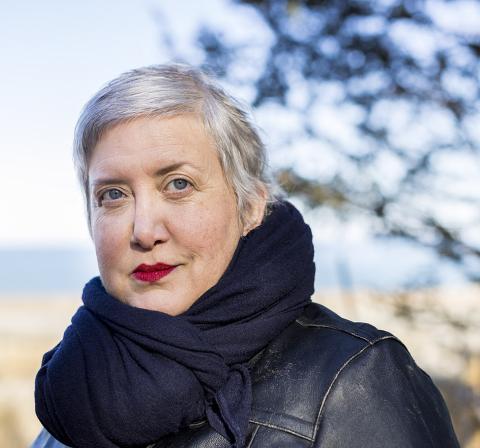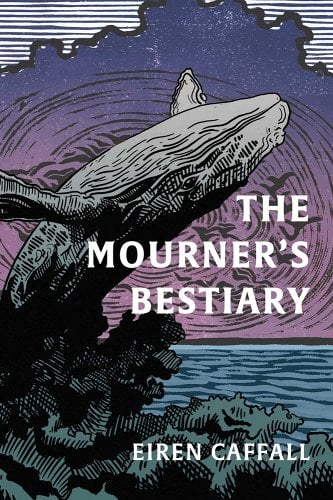
The Mourner's Bestiary
The project:
The Mourner’s Bestiary is a meditation on grief and survival told through the stories of animals in two collapsing marine ecosystems—the Gulf of Maine and the Long Island Sound—and the lives of a family facing a life-threatening illness on their shores. The Gulf of Maine is the world’s fastest-warming marine ecosystem, and the Long Island Sound has been the site of conservation battles that predict the fights ahead for the Gulf. Eiren Caffall carries a family legacy of two hundred years of genetic kidney disease, raising a child who may also. The Mourner’s Bestiary braids environmental research with a memoir of generational healing, and the work it takes to get there for the human and animal lives caught in tides of loss.
From The Mourner's Bestiary:
The longfin inshore squid is not under threat in a warming world. New residents of the Gulf of Maine and the Long Island Sound, they are abundant enough and unique enough in their body plan to be excellent subjects for scientific testing. Humans and modern cephalopods share a common ancestor and the results of ancestral innovations. Ancient cephalopods pioneered the neuron, that single genetic adaptation that allows creatures, squid and human alike, to think and feel. These neurons hold the key to understanding fear.
Human and squid neurons share structural features, including how they translate impulses in the brain into action. Neurons have three parts—the cell body, the dendrites, and the axon. The axon is the thread that connects the impulses of the dendrites, through the cell body, to the destination of the impulse, either inches away in the brain, or down the body to the feet. When the neuron tells you to run from danger, it is the axon that delivers the news. Longfin squid have one of the largest neural axons relative to their body size of any creature. While a single human axon cannot be removed from the brain for study—being impossibly slim—the squid neuron can be manually removed and placed under a powerful microscope to track how electrical impulses move.
Discoveries from the study of longfin axons have been awarded Nobel prizes, making possible research that may lead to cures for Alzheimer’s disease and Parkinson’s. Without the longfin squid, we would not understand the specific way in which messages of fear, or any other emotion, flow through the human body.
The waters around us that night on Monhegan Island teemed with new messengers of emotion in a time when we are all overwhelmed with worry for the natural world. The waters were warmer, the squid was evidence, time was precious. The peace of the island was giving way for me. The squid made me worry for the Gulf as dark came down, and with it came another worry for my son. If generations of animals were threatened in the face of warming seas, my own generational project of family was threatened by polycystic kidney disease. I knew Dex was inheriting a warming ocean; I still had no idea if he had inherited my illness.
I had fought against generations of fear to decide to have Dex. His birth came with a 50/50 chance I would pass on what killed his ancestors, what was killing me. Only my father, of all his siblings, had a biological child. By the time I was conceived, he thought he'd dodged the disease, only to find out the year after I was born that he hadn’t. His brother and sister had no children and his other brother had adopted, all to stop our genetic illness from coming for the next generation. In choosing to conceive, I’d reached forward in time towards healing, backward in time to soothe mourning that has accompanied a legacy of loss and interrupted future.
The grant jury: Beguiling, idiosyncratic: Eiren Caffall makes an original contribution to the growing genre of memoirs that explore illness and healing. The Mourner’s Bestiary draws a poetic parallel between the body’s experience of chronic disease and the marine ecosystems Caffall knows well—an unexpected juxtaposition that gives new dimension to climate hazards we face and opportunities to address them. Caffall writes with plangent intensity about our responsibility toward the planet, and her eye for the wonder and beauty of ocean life pierces the illusion of disconnected existence. Water becomes an element that draws us together.
Eiren Caffall is a writer and musician based in Chicago. Her writing has appeared in Guernica, Los Angeles Review of Books, Literary Hub, Al Jazeera, and The Rumpus, and she has recorded three albums. Her film Becoming Ocean screened at national and international film festivals. She received a Social Justice News Nexus fellowship in environmental journalism at Northwestern University’s Medill School of Journalism, and has had residencies at the Banff Centre for the Arts, Millay Colony, Hedgebrook, and Ragdale.
Selected Works
